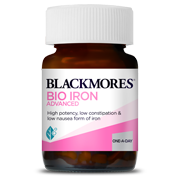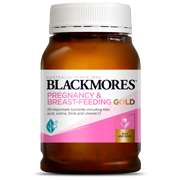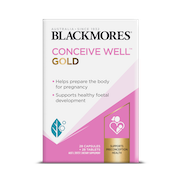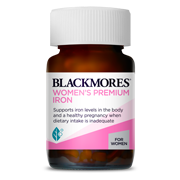Iron
Pregnancy and preconception
Blackmores Pregnancy & Breast-Feeding Gold Mini
On Sale
Blackmores Pregnancy & Breast-Feeding Gold Mini provides 20 important nutrients, including folic acid and vitamin D3, to support women’s and…
Always read the label and follow the directions for use. Read the warnings below before purchase.
$62.99
$89.99
Concentrated omega-3 triglycerides fish 125 mg
Nicotinamide 4.5 mg
Ascorbic acid (vitamin C) 15 mg
Calcium carbonate (calcium 25 mg) 62.5 mg
Biotin 7.5 µg
Iron (II) glycinate (iron 2.5 mg) 9.25 mg
Zinc sulfate monohydrate (zinc 2.75 mg) 7.62 mg
Heavy magnesium oxide (magnesium 17.5 mg) 29.1 mg
Selenomethionine (selenium 16.25 μg) 40.6 µg
Chromium picolinate (chromium 7.5 µg) 60.5 µg
Thiamine nitrate (vitamin B1 350 µg) 432 µg
Riboflavin (vitamin B2) 350 µg
Calcium pantothenate (pantothenic acid, vitamin B5 1.25 mg) 1.36 mg
Pyridoxine hydrochloride (pyridoxine, vitamin B6 475 µg) 577 µg
Cyanocobalamin (vitamin B12) 0.65 µg
Colecalciferol (vitamin D3 250 IU) 6.25 µg
Folic acid 125 µg
d-alpha-Tocopherol (natural vitamin E 2.61 IU) 1.75 mg
Potassium iodide (iodine 37.5 µg) 49.3 µg
Betacarotene 1.2 mg
Dosage
Adults: Take 2 capsules two times a day, or as professionally prescribed. Take with food. (Total: 4 capsules a day)
- KEEP OUT OF REACH OF CHILDREN.
- Always read the label and follow the directions for use.
- If you are pregnant or breastfeeding, or on warfarin therapy, talk to your health professional before use. If symptoms persist, talk to your health professional.
- Dietary supplements can only be of assistance if dietary intake is inadequate.
- Always talk to your health professional before taking multiple products for pregnancy.
- Do not exceed the stated dose except on medical advice.
- lf you have had a baby with a neural tube defect/spina bifida, seek specific medical advice.
- This product contains selenium which is toxic in high doses.
- A daily dose of150 micrograms for adults of selenium from dietary supplements should not be exceeded. Vitamin supplements should not replace a balanced diet.
- Advise your doctor of any medicine you take during pregnancy, particularly in your first trimester.
- lf you are concerned about the health of yourself or your baby, talk to your health practitioner.
- Store below 30°C in a dry place away from direct sunlight.
- If you have any pre-existing conditions, or are on any medications always talk to your health professional before use.
- Some products should be ceased at least two weeks before any elective surgery, please confirm with your health professional.
- Store below 30°C in a dry place away from direct sunlight.
- Do not use if cap seal is broken or missing.
- Contains sulfites, fish and soya bean products.
Women's health
Blackmores Bio Iron Advanced
On Sale
A lower constipation iron formulation which is gentle on the digestive system.
Always read the label and follow the directions for use. Read the warnings below before purchase.
$12.94
$18.49
Iron (II) glycinate (iron 20 mg) 73 mg
Ascorbic acid (vitamin c) 170 mg
Betacarotene 1.35 mg
Folic acid 300 microgram
Cyanocobalamin (vitamin B12) 50 microgram
Pyridoxine hydrochloride (vitamin B6, pyridoxine 5 mg) 6.08 mg
Riboflavin (vitamin B2) 1.3 mg
Dosage
- Always read the label and follow the directions for use.
- If symptoms persist talk to your health professional.
- Vitamin supplements should not replace a balanced diet.
- Not for the treatment of iron deficiency conditions.
- If you are pregnant or breastfeeding, talk to your health professional before use.
- If you have any pre-existing conditions, or are on any medications always talk to your health professional before use.
Pregnancy and preconception
Blackmores Pregnancy & Breast-Feeding Gold
On Sale
Formulated with 20 important nutrients to support a healthy pregnancy including folic acid, iron, DHA, and vitamin D.
Always read the label and follow the directions for use. Read the warnings below before purchase.
$26.59
$37.99
With omega-3 DHA to support baby’s brain and nervous system development, it also contains a lower constipation iron which is gentle on the digestive system.
Concentrated omega-3 triglycerides fish 250 mg containing omega-3 marine triglycerides 150 mg
Nicotinamide (vitamin B3) 9 mg
Ascorbic acid (vitamin C) 30 mg
Calcium carbonate (calcium 50 mg) 125 mg
Biotin 15 microgram
Iron (II) glycinate (iron 5 mg) 19.2 mg
Zinc oxide (zinc 5.5 mg) 6.8 mg
Heavy magnesium oxide (magnesium 35 mg) 58.1 mg
Selenomethionine (selenium 32.5 microgram) 81.3 microgram
Chromium picolinate (chromium 15 microgram) 121 microgram
Thiamine nitrate (vitamin B1) 700 µg
Riboflavin (vitamin B2) 700 µg
Calcium pantothenate (pantothenic acid, vitamin B5 2.5 mg) 2.7 mg
Pyridoxine hydrochloride (pyridoxine, vitamin B6 950 µg) 1.2 mg
Cyanocobalamin (vitamin B12) 1.3 microgram
Colecalciferol (vitamin D 500 IU) 12.5 microgram
Folic acid 250 microgram
d-alpha-Tocopherol (natural vitamin E 5.22 IU) 3.5 mg
Potassium iodide (iodine 75 microgram) 98.3 microgram
Betacarotene 2.4 mg
Dosage
Adults – Take 2 capsules, once a day, or as professionally prescribed. Take with food.
- Always talk to your health professional before taking multiple products for pregnancy.
- Follow the directions for use.
- Vitamin supplements should not replace a balanced diet.
- Drink plenty of water. Advise your doctor of any medicine you take during pregnancy, particularly in your first trimester. If you are concerned about the health of yourself or your baby, talk to your health practitioner.
- Contains fish, sulfites and soya bean products.
- Do not exceed the stated dose except on medical advice. If you have had a baby with a neural tube defect / spina bifida, seek medical advice.
- This product contains selenium which is toxic in high doses. A daily dose of 150 microgram for adults of selenium from dietary supplements should not be exceeded.
- If you have any pre-existing conditions, or are on any medications always talk to your health professional before use.
- Some products should be ceased at least two weeks before any elective surgery, please confirm with your health professional.
Pregnancy and preconception
Blackmores Conceive Well™ Gold
On Sale
A formulation of essential nutrients to help prepare for healthy conception.
Always read the label and follow the directions for use. Read the warnings below before purchase.
$33.59
$47.99
Potassium iodide (iodine 150 microgram) 197 microgram
Folic acid 500 microgram
Cupric sulfate anhydrous (copper 1.3 mg) 3.3 mg
Riboflavin (vitamin B2) 1.5 mg
Thiamine nitrate (thiamine, vitamin B1 1.2 mg) 1.5 mg
Manganese sulfate monohydrate (manganese 5 mg) 15.4 mg
Zinc sulfate monohydrate (zinc 15 mg) 41.6 mg
Nicotinamide 20 mg
Ferrous fumarate (iron 24 mg) 75.4 mg
Pyridoxine hydrochloride (pyridoxine, vitamin B6 41.2 mg) 50 mg
Cyanocobalamin (vitamin B12) 50 microgram
Heavy magnesium oxide (magnesium 200 mg) 350 mg
Ascorbic acid 200 mg
Calcium ascorbic dihydrate (ascorbic acid, vitamin C 300 mg) 363 mg
Total vitamin C 500 mg
Selenomethionine (selenium 65 microgram) 161 micrograms
Biotin 100 microgram
Calcium pantothenate (pantothenic acid, vitamin B5 4.6 mg) 5 mg
Dosage
Adults – Take 1 capsule and 1 tablet once a day, or as professionally prescribed. Take with food. Ideally taken up to six months before conception.
Once you fall pregnant stop using this product and switch to Blackmores Pregnancy and Breast-Feeding Gold.
- Always read the label and follow the directions for use.
- Additional supplements may be needed when you are pregnant, discuss with your individual requirements with your health professional.
- Do not exceed the stated dose except on medical advice. If you have had a baby with a neural tube defect you should seek specific medical advice.
- Do not take while on warfarin therapy without medical advice.
- This medicine contains selenium which is toxic in high doses. A daily dose of 150 micrograms for adults of selenium from dietary supplements should not be exceeded.
- Once you fall pregnant stop using this product and switch to Blackmores Pregnancy & Breastfeeding Gold.
- Advise your doctor of any medicine you take during pregnancy, particularly in your first trimester. If you are concerned about the health of yourself or your baby, talk to your health practitioner.
- If you have any pre-existing conditions, or are on any medications always talk to your health professional before use.
- Some products should be ceased at least two weeks before any elective surgery, please confirm with your health professional.
- WARNING - Stop taking this medication if you experience tingling, burning or numbness and see your healthcare practitioner as soon as possible. (Contains vitamin B6)
- Contains fish, soya bean products and sulfites.
Iron
Blackmores Iron Rapi-Melt™
On Sale
Blackmores Iron Rapi-Melt™ is a great tasting and fast dissolving tropical flavoured melt that supports iron levels in the body.
Always read the label and follow the directions for use. Read the warnings below before purchase.
$19.60
$28.00
No water, no worries with this rapidly absorbed format that melts in the mouth.
Ascorbic acid (vitamin C) 30 mg
Iron amino acid chelate (iron 8 mg) 40 mg
Dosage
Adults, breastfeeding women and children 12 years and over – Dissolve 1 melt (orally disintegrating tablet) in your mouth, two times a day. No water required.
Pregnant women – Dissolve 1 melt (orally disintegrating tablet) in your mouth, three times a day. No water required.
- KEEP OUT OF REACH OF CHILDREN.
- Always read the label and follow the directions for use.
- Always talk to your health professional before taking multiple products for pregnancy. Advise your doctor of any medicine you take during pregnancy, particularly in your first trimester. Use in children only under adult supervision. Not recommended for children under 12 years.
- Not for the treatment of iron deficiency conditions. If symptoms persist, talk to your health professional. Dietary supplements can only be of assistance if dietary intake is inadequate.
- If you have any pre-existing conditions, or are on any medications always talk to your health professional before use.
- Some products should be ceased at least two weeks before any elective surgery, please confirm with your health professional.
- Contains sulfites.
Pregnancy and preconception
Blackmores Women's Premium Iron
Out of stock
With iron glycinate to relieve fatigue and support energy levels when dietary intake is inadequate.
Always read the label and follow the directions for use. Read the warnings below before purchase.
$10.49
$14.99
Iron (II) glycinate (iron 24 mg) 87.7 mg
Dosage
- Always read the label and follow the directions for use.
- Not for the treatment of iron deficiency conditions.
- If you are concerned about the health of your baby, talk to your health professional.
- Advise your doctor of any medicine you take during pregnancy, particularly in your first trimester.
- If symptoms persist, talk to your health professional.
- Supplements can only be of assistance if dietary intake is inadequate.
- Always talk to your health professional before taking multiple products for pregnancy.
- If you have any pre-existing conditions or are on any medications, always talk to your health professional before use.
- Contains sulfites.






